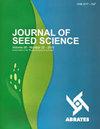山梨果实生物特征及成熟度对品质的影响。种子
IF 1.2
4区 农林科学
Q3 AGRONOMY
引用次数: 0
摘要
摘要/ Abstract摘要:本研究旨在评价薯蓣果实和种子的生物特征。在不同的温度下,从三个成熟阶段的果实中获得的种子萌发和形成。从100个果实和100个种子中获得了生物特征数据。果实生物计量学的决定参数为:长、宽、质量和种子/果数;种子生物计量学的决定参数为:长、宽、厚和质量。在发芽试验中,采用因子方案(3x4),三个成熟期(绿色、中间和淡红色)和四种温度(20、25、30和35°C)。分析变量为:发芽率、发芽速度指数(GSI)、平均发芽时间(MGT)、达到50%发芽率(t50)、幼苗百分比、茎和根的长度和干质量、穗圈直径。果实和种子在单果鲜质量和单果种子数等参数上差异较大。红色果实种子的萌发速度指数较高,绿色果实种子的幼苗发育较好。建议在25和30°C的温度下进行三个成熟期的种子发芽试验。本文章由计算机程序翻译,如有差异,请以英文原文为准。
Fruit biometrics and maturity on the quality of Diospyros inconstans Jacq. Seeds
Abstract: This study aimed to evaluate the biometric characteristics of fruits and seeds of Diospyros inconstans Jacq., germination and formation of seedlings obtained from fruits at three maturity stages, subjected to different temperatures. Biometric data were obtained from 100 fruits and 100 seeds. The determining parameters in the biometry of the fruits were: length, width, mass and number of seeds/fruit and for the seeds: length, width, thickness and mass. In the germination test, a factorial scheme (3x4), three maturity stages (green, intermediate and reddish), and four temperatures (20, 25, 30 and 35 °C) were used. The analyzed variables were: germination, germination speed index (GSI), mean germination time (MGT), time to obtain 50% germination (t50), percentage of seedlings, length and dry mass of shoots and roots, and collar diameter. Fruits and seeds showed greater variation in the parameters fresh mass and number of seeds per fruit. The germination speed index was higher in seeds from reddish fruits, and seeds from green fruits originated better-developed seedlings. Temperatures of 25 and 30 °C are recommended for conducting the seed germination test at the three maturity stages.
求助全文
通过发布文献求助,成功后即可免费获取论文全文。
去求助
来源期刊

Journal of Seed Science
Agricultural and Biological Sciences-Agronomy and Crop Science
CiteScore
2.00
自引率
30.00%
发文量
28
审稿时长
12 weeks
期刊介绍:
From 2017 the Journal of Seed Science (JSS) will circulate online version only.
Original scientific studies and communications, not yet published or submitted to another journal for publication and written in Portuguese or English, will be accepted for publication. For manuscripts submitted in English, the authors should provide an adequated version.
The SCIENTIFIC COMMUNICATION is a category of scientific manuscript which describes a technique, an equipment, new species or observations and surveys of limited results. It has the same scientific rigor as the “Scientific Articles” and the same value as a publication. The classification of a manuscript as a SCIENTIFIC COMMUNICATION is based on its content and scientific merit but it can be a preliminary study, simple and not definitive on a certain subject, with publication justified by its uniqueness and contribution to the area.
The Editorial Board of the JSS may invite leading authors of recognized reputation to compose specific Review Articles covering topics of their specialization that will convey to the scientific community the state-of-the-art knowledge related to the specific theme.
 求助内容:
求助内容: 应助结果提醒方式:
应助结果提醒方式:


